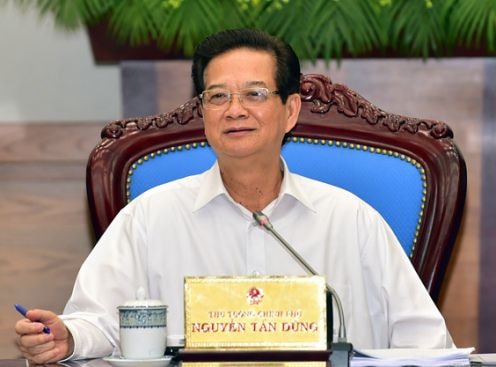Let the people do it, from the Government's message to its actions
“What kind of investor selection procedure takes 588 days? How can we industrialize and modernize, how can we improve national competitiveness?” – Prime Minister Nguyen Tan Dung said.
Prime Minister Nguyen Tan Dung has just chaired a national online conference to review the implementation of Resolution No. 13-NQ/TW of the Central Executive Committee on building synchronous infrastructure to turn our country into a modern industrialized country by 2020.
 |
| Prime Minister Nguyen Tan Dung |
The outstanding content that received high consensus from the conference attendees was a policy mentioned in the Resolution: Strongly mobilizing all resources, attracting investors to develop infrastructure.
According to the evaluation opinions at the preliminary review conference, the implementation of Resolution 13 not only creates a new face for the infrastructure system, but more importantly, awareness of applying market mechanisms in mobilizing and using resources, thereby mobilizing significant capital from businesses and people to participate in investing in infrastructure development.
In fact, promoting the socialization of infrastructure development is only part of the message expressed through a series of policies that the Government and the Prime Minister have resolutely implemented in recent times: Promoting the equitization of state-owned enterprises; removing all barriers to maximize the people's freedom of business; promoting the socialization of public services... That message, in short, is to let the people do it.
According to Deputy Prime Minister Hoang Trung Hai, “if we do not socialize, public investment will be spread out forever, and there will be eternal pressure on it.” However, this policy was not only introduced because of difficulties in the State budget - which has been mentioned a lot recently. There is much more evidence and more valid and fundamental reasons for us to continue promoting this policy.
The policy of socialization not only helps reduce the State's investment, lessening the burden on the budget, but also helps increase the overall investment efficiency of the entire economy. As the Prime Minister commented, previously, public investment accounted for 70% of total social investment, but now it is only half; total social investment in 2014 only reached about 30-31% of GDP, lower than previous years, but economic growth was higher.
Looking more broadly, it is necessary to reiterate the viewpoint affirmed by the Prime Minister in his New Year Message 2014: For the country to develop rapidly and sustainably, the State must perform well its development creation function. The State does not act on behalf of the people, but must focus on building a suitable institutional framework and creating the necessary conditions for everyone to promote their capacity and creativity for their own benefit and to contribute to society.
Also in this Message, the Prime Minister pointed out that national resources must be allocated to those entities with the capacity to use them most effectively for the country. In other words, whether the private sector or the State does it, they are all national resources. Whoever does it better and uses the resources better will have access to the resources. This is truly a strong shift in development thinking.
It must be admitted that, for that innovative viewpoint to penetrate deeply into life, to mobilize the enormous resources that are still hidden somewhere in the people, there is still a very long way to go. Difficulties and obstacles to socialization come not only from those who want to profit from public investment, but also from prejudices that are unsympathetic about the role of the private sector that still exist somewhere.
And finally, there are the barriers from current procedures, mechanisms and policies, with all the complexities and entanglements that sometimes seem like a "mess" that makes it hard to know where to start solving. Right in the investment field, at the conference, Vice Chairman of the Ho Chi Minh City People's Committee Nguyen Huu Tin gave an example that, according to Prime Minister Nguyen Tan Dung, was "startling": The process of selecting investors for infrastructure according to Decree 30 guiding the Law on Bidding on selecting investors takes 588 days. That is doing it according to regulations, but in reality it can take longer.
The Prime Minister's natural reaction was "what kind of investor selection procedure takes 588 days, how can we industrialize and modernize, how can we improve national competitiveness?" He reminded that the procedures and policies "we set ourselves and we must fix them. We must manage, but we need to reform the management method, ensuring the most openness and convenience for people and businesses."
In other words, to attract people's participation, the mechanism, policies and procedures must be most favorable for them. It is clear that in recent times, the Government and the Prime Minister have had very drastic solutions, touching the root of the problem, notably the consecutive issuance of two Resolutions No. 19/NQ-CP in 2014 and 2015 on improving the business environment and enhancing national competitiveness.
A series of legal documents on tax, customs, business start-up... and policies on public-private partnership issued and amended in a short period of time have really strongly changed the business environment, "creating conditions for society to perform functions and jobs that society can do better", as requested in the Prime Minister's New Year Message 2014.
The space for each citizen to develop their capacity and creativity for their own benefit and contribute to society, not only on paper or in words, but is also being expanded through specific policy actions of the Government.
According to chinhphu.vn






